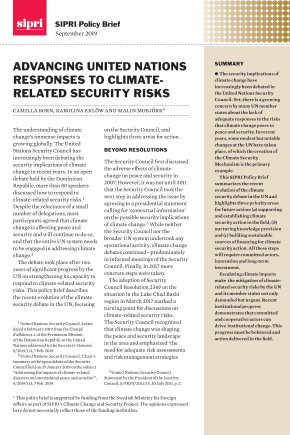Advancing United Nations Responses to Climate-related Security Risks
The security implications of climate change have increasingly been debated in the United Nations Security Council. Yet, there is a growing concern by many UN member states about the lack of adequate responses to the risks that climate change poses to peace and security. In recent years, some modest but notable changes at the UN have taken place, of which the creation of the Climate Security Mechanism is the primary example.
This SIPRI Policy Brief summarizes the recent evolution of the climate security debate in the UN and highlights three priority areas for future action: (a) supporting and establishing climate security action in the field, (b) nurturing knowledge provision and (c) building sustainable sources of financing for climate security action. All these steps will require committed actors, innovation and long-term investment.
Escalating climate impacts make the mitigation of climate-related security risks by the UN and its member states not only demanded but urgent. Recent institutional progress demonstrates that committed and cooperative actors can drive institutional change. This progress must be bolstered and action delivered in the field.
Beyond resolutions
Institutional capacity
What next for the UN system?
Conclusions



